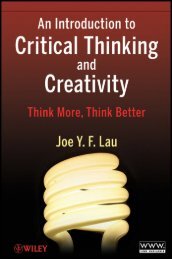- Page 2 and 3: ISSN: 2277-9426 Journal of Bengali
- Page 4 and 5: Contents Editorial 5 Articles Towar
- Page 6 and 7: Editorial Bengal has a glorious his
- Page 8 and 9: 7|Journal of Bengali Studies, Vol.
- Page 10 and 11: 9|Journal of Bengali Studies, Vol.
- Page 12 and 13: 11|Journal of Bengali Studies, Vol.
- Page 14 and 15: 13|Journal of Bengali Studies, Vol.
- Page 16 and 17: 15|Journal of Bengali Studies, Vol.
- Page 18 and 19: 17|Journal of Bengali Studies, Vol.
- Page 20 and 21: 19|Journal of Bengali Studies, Vol.
- Page 22 and 23: 21|Journal of Bengali Studies, Vol.
- Page 24 and 25: 23|Journal of Bengali Studies, Vol.
- Page 26 and 27: 25|Journal of Bengali Studies, Vol.
- Page 30 and 31: 29|Journal of Bengali Studies, Vol.
- Page 32 and 33: 32|Journal of Bengali Studies, Vol.
- Page 34 and 35: 33|Journal of Bengali Studies, Vol.
- Page 36 and 37: 35|Journal of Bengali Studies, Vol.
- Page 38 and 39: 37|Journal of Bengali Studies, Vol.
- Page 40 and 41: 39|Journal of Bengali Studies, Vol.
- Page 42 and 43: 41|Journal of Bengali Studies, Vol.
- Page 44 and 45: 43|Journal of Bengali Studies, Vol.
- Page 46 and 47: 45|Journal of Bengali Studies, Vol.
- Page 48 and 49: 47|Journal of Bengali Studies, Vol.
- Page 50 and 51: 49|Journal of Bengali Studies, Vol.
- Page 52 and 53: Utopias of Celluloid Love: The Gold
- Page 54 and 55: 53|Journal of Bengali Studies, Vol.
- Page 56 and 57: 55|Journal of Bengali Studies, Vol.
- Page 58 and 59: 57|Journal of Bengali Studies, Vol.
- Page 60 and 61: 59|Journal of Bengali Studies, Vol.
- Page 62 and 63: 61|Journal of Bengali Studies, Vol.
- Page 64 and 65: 63|Journal of Bengali Studies, Vol.
- Page 66 and 67: 65|Journal of Bengali Studies, Vol.
- Page 68 and 69: 67|Journal of Bengali Studies, Vol.
- Page 70 and 71: 69|Journal of Bengali Studies, Vol.
- Page 72 and 73: 71|Journal of Bengali Studies, Vol.
- Page 74 and 75: 73|Journal of Bengali Studies, Vol.
- Page 76 and 77: 75|Journal of Bengali Studies, Vol.
- Page 78 and 79:
77|Journal of Bengali Studies, Vol.
- Page 80 and 81:
79|Journal of Bengali Studies, Vol.
- Page 82 and 83:
81|Journal of Bengali Studies, Vol.
- Page 84 and 85:
83|Journal of Bengali Studies, Vol.
- Page 86 and 87:
85|Journal of Bengali Studies, Vol.
- Page 88 and 89:
Writing a Biography of Bengali Film
- Page 90 and 91:
89|Journal of Bengali Studies, Vol.
- Page 92 and 93:
91|Journal of Bengali Studies, Vol.
- Page 94 and 95:
93|Journal of Bengali Studies, Vol.
- Page 96 and 97:
95|Journal of Bengali Studies, Vol.
- Page 98 and 99:
97|Journal of Bengali Studies, Vol.
- Page 100 and 101:
99|Journal of Bengali Studies, Vol.
- Page 102 and 103:
101|Journal of Bengali Studies, Vol
- Page 104 and 105:
103|Journal of Bengali Studies, Vol
- Page 106 and 107:
105|Journal of Bengali Studies, Vol
- Page 108 and 109:
107|Journal of Bengali Studies, Vol
- Page 110 and 111:
109|Journal of Bengali Studies, Vol
- Page 112 and 113:
111|Journal of Bengali Studies, Vol
- Page 114 and 115:
113|Journal of Bengali Studies, Vol
- Page 116 and 117:
115|Journal of Bengali Studies, Vol
- Page 118 and 119:
117|Journal of Bengali Studies, Vol
- Page 120 and 121:
119|Journal of Bengali Studies, Vol
- Page 122 and 123:
121|Journal of Bengali Studies, Vol
- Page 124 and 125:
123|Journal of Bengali Studies, Vol
- Page 126 and 127:
125|Journal of Bengali Studies, Vol
- Page 128 and 129:
127|Journal of Bengali Studies, Vol
- Page 130 and 131:
129|Journal of Bengali Studies, Vol
- Page 132 and 133:
131|Journal of Bengali Studies, Vol
- Page 134 and 135:
133|Journal of Bengali Studies, Vol
- Page 136 and 137:
135|Journal of Bengali Studies, Vol
- Page 138 and 139:
137|Journal of Bengali Studies, Vol
- Page 140 and 141:
139|Journal of Bengali Studies, Vol
- Page 142 and 143:
141|Journal of Bengali Studies, Vol
- Page 144 and 145:
143|Journal of Bengali Studies, Vol
- Page 146 and 147:
145|Journal of Bengali Studies, Vol
- Page 148 and 149:
147|Journal of Bengali Studies, Vol
- Page 150 and 151:
149|Journal of Bengali Studies, Vol
- Page 152 and 153:
151|Journal of Bengali Studies, Vol
- Page 154 and 155:
153|Journal of Bengali Studies, Vol
- Page 156 and 157:
155|Journal of Bengali Studies, Vol
- Page 158 and 159:
157|Journal of Bengali Studies, Vol
- Page 160 and 161:
159|Journal of Bengali Studies, Vol
- Page 162 and 163:
161|Journal of Bengali Studies, Vol
- Page 164 and 165:
163|Journal of Bengali Studies, Vol
- Page 166 and 167:
165|Journal of Bengali Studies, Vol
- Page 168 and 169:
167|Journal of Bengali Studies, Vol
- Page 170 and 171:
Pather Dabi and Revolutionary Natio
- Page 172 and 173:
171|Journal of Bengali Studies, Vol
- Page 174 and 175:
173|Journal of Bengali Studies, Vol
- Page 176 and 177:
175|Journal of Bengali Studies, Vol
- Page 178 and 179:
177|Journal of Bengali Studies, Vol
- Page 180 and 181:
Kahaani and Bhooter Bhobishyot: Two
- Page 182 and 183:
182|Journal of Bengali Studies, Vol
- Page 184 and 185:
183|Journal of Bengali Studies, Vol
- Page 186 and 187:
185|Journal of Bengali Studies, Vol
- Page 188 and 189:
187|Journal of Bengali Studies, Vol
- Page 190 and 191:
Creative Workshop: Theory in Practi
- Page 192 and 193:
191|Journal of Bengali Studies, Vol
- Page 194 and 195:
193|Journal of Bengali Studies, Vol
- Page 196 and 197:
195|Journal of Bengali Studies, Vol
- Page 198 and 199:
197|Journal of Bengali Studies, Vol
- Page 200 and 201:
199|Journal of Bengali Studies, Vol
- Page 202 and 203:
201|Journal of Bengali Studies, Vol

















